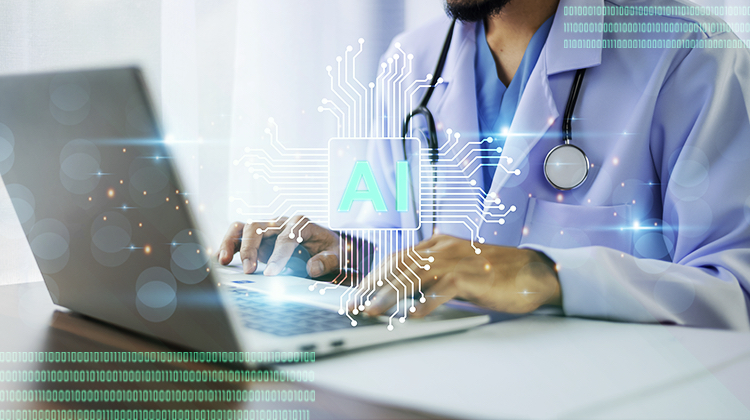3 Ways AI in Healthcare Is Transforming the Industry

By leveraging artificial intelligence, healthcare companies can mitigate staff shortages and ease doctors’ and nurses’ workload.
AI solutions are also proving to be a powerful way to elevate the patient experience and quality of care metrics.
Many healthcare organizations have already leveraged AI to reduce provider burden, improve clinical decision support models, and expand the possibilities of patient care, according to Health IT News.
At the same time, they’re seeing gains in cost efficiency, quality improvement, and more.
Let’s look at three key areas in which custom artificial intelligence healthcare solutions can significantly impact hospitals and healthcare providers.
1. Mitigating Staff Shortages
Healthcare organizations face significant staffing challenges. According to the National Library of Medicine, there is a worldwide shortage of 5.9 million nurses and 4.3 million doctors.
In the United States, 18 percent of healthcare workers left their jobs because of the pandemic, and 17 percent of nurses will retire within the next ten years. By 2031, experts expect the US to be approximately 200,000 nurses short.
And it’s not just nurses; 40 percent of doctors are also considering leaving, according to the American Medical Association.
In turning to artificial intelligence, healthcare organizations hope to mitigate these staffing shortages. By leveraging AI and LLM software, organizations empower nonphysician healthcare workers, such as nurses, aides, and therapists, to take some of the workload off physicians. AI empowers these workers to navigate patient records, answer common questions, and facilitate patient care coordination.
AI solutions also give patients self-service options for basic healthcare needs, reducing the time physicians spend answering routine questions and ensuring timely and appropriate care interventions.
In short, AI software should allow healthcare organizations to do more with less.
2. Easing the Healthcare Workload
As artificial intelligence in health care sees wider adoption, the burden on doctors and healthcare workers should decrease, allowing them to focus more on patient care and less on routine tasks. Not only will this improve health outcomes, but it will likely increase patient satisfaction.
Simplifying Data Entry
Doctors want to have meaningful interactions with their patients. Too often, however, administrative tasks prevent them from getting this quality time. Many physicians say electronic health record (EHR) systems eat up much of their time with patients. These systems are designed more for data entry and less for efficient information retrieval.
It commonly takes doctors and nurses several minutes to enter data into EHRs during and after patient encounters. AI in healthcare settings can automate such documentation tasks. Clinicians can simply speak their notes, and the system will record and update the EHR, reducing the time spent manually entering data.
Enhancing Access to PI
Getting information out of EHRs is just as difficult. Due to these systems’ inefficiencies, clinicians have to wade through a mass of notes from a patient’s previous visits.
With artificial intelligence, healthcare organizations can make getting patient information (PI) out of EHRs easier. Doctors and nurses can use ChatGPT-like interfaces to make natural language queries, like “Does this patient have a family history of cancer?” or “What is the trend of the patient’s blood pressure over the past year?” AI can accurately answer these queries in seconds, whereas it would take a healthcare worker much longer.
3. Empowering Patients
Healthcare organizations have already leveraged the custom development of EHRs, data warehouses, and analytical platforms to streamline operations and elevate the quality of the care they provide. By adding AI to the mix, they can also create solutions that empower their patients.
With artificial intelligence, healthcare institutions can essentially create a plain-language knowledge base, overcoming data variability challenges. The AI software can interpret and process information regardless of source or format, eliminating the need for intricate data mapping or standardization.
Using custom healthcare AI solutions, providers can turn this knowledge base into an easily accessible patient-facing solution that delivers answers on a wide range of health topics. Patients and their caregivers can obtain immediate responses to questions about their care that formerly would have required them to talk to a human. They can get answers to questions such as:
- Am I allowed to drink water before my procedure?
- What is my out-of-pocket cost for this treatment?
- Is it normal to have dizziness after anesthesia?
Healthcare AI software can also help them do basic tasks like ordering medication refills, finding specialists, or discovering discounts or cheaper sources for their medications.
Combining AI and Healthcare
A healthcare AI solution like this could use the provider’s existing infrastructure, adding three new parts: a knowledge store, a language interface, and a risk mitigation layer.
The AI architecture utilizes the existing data sources, but instead of the time and expense of converting them to rigid data warehouse schemas, they’re converted into plain text and saved in a knowledge store.
Healthcare organizations have spent more than 20 years trying to map their data to data warehouses, but few have realized this goal. Now, they don’t have to.
AI allows people to ask questions and get answers in plain language—and in whatever language they speak. Doctors, nurses, patients, caregivers, and anyone else can now get answers they can understand without delay. A language interface powered by AI can convert questions asked in plain language into SQL code and return answers without intervention from a data engineer.
Risk Management for AI in Healthcare
When deploying artificial intelligence, healthcare companies must manage risk. An AI-enhanced EHR involves inserting a risk management layer to ensure the information provided is accurate and appropriate. This layer uses judiciously selected data to ensure sensitive or inappropriate queries are handled properly.
The risk management process involves creating alternate versions of a question and evaluating how consistently the AI answers them. Human healthcare professionals review the answers, and their feedback is used to optimize the AI’s performance.
The Impact of AI and Healthcare
According to the Congressional Budget Office, the US population in 2024 consists of 342 million people—all of whom will be patients and/or caregivers at some point. Enabling them to perform healthcare tasks with AI can have a considerable impact.
If AI fields even a few of their questions and requests, it means thousands of daily calls that doctors, nurses, and other healthcare workers don’t have to field. Not only does this relieve some of their burden, but it also means faster delivery of the information patients need, which improves care quality and provides a better patient experience.
Combine this with making EHRs less burdensome for healthcare workers, and the advantages of artificial intelligence healthcare solutions become more apparent. Not only can hospitals and healthcare organizations leverage AI to mitigate staff shortages, but they may be able to use this technology to alleviate much of the pressure causing doctors and nurses to leave the industry in the first place.

